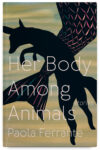 [Europa, 2016]
[Europa, 2016]
Two years ago I made an appointment — three weeks in advance — at a salon in DC. My plan was to cut off my unquestionably feminine shoulder-length locks. I gave myself three weeks to change my mind about the pixie cut. I was afraid that once my hair was gone, I wouldn’t feel like a girl, that I wouldn’t “feel” pretty. As my hair fell to the floor in clumps, a man in the booth next to me said, “Wow, you’re really going for it!” It felt so unsettling to have that commentary from anyone — not supportive, yet not judgmental. After cutting my hair, I overcompensated on my girly-ness, wearing only skirts and dresses for a month. But I quickly came to terms with my hair, realizing that short hair was my method of enacting femininity. Still, to forcibly shed a tangible thing that makes you feel in control of your womanliness, to be unable to ignore the comment “Wow, you’re really going for it!”? That is something else entirely.
This lack of control is where Yolanda and Verla find themselves at the start of Charlotte Wood’s feminist horror novel, The Natural Way of Things. The two girls, unknown to each other, who have been heavily drugged, wake up in a room wearing “absurd costume[s]”: “stiff long green” canvas smocks, “coarse” calico blouses beneath, woolen socks, and leather boots. A man walks in: “‘Right,’ he says. ‘Who wants to go first?’” Yolanda goes first. She “gasp[s] aloud at the feel of her own half-shorn head,” and the man shaving her “frown[s] and sa[ys], ‘Shut up.’ And then experimentally, as if testing the word, as if he’[s] never said it before, ha[s] just learned it, add[s], ‘You slut.’”
As her hair falls to the ground Yolanda looks down at the floor and muses, “Hair [i]s only hair, as it f[alls].” But, hair is not “only” hair. While on her head, Yolanda’s hair could have been a manifestation of her femininity — a visual declaration of how she chooses to interpret being a woman. While the man shaves the hair off against her will, Yolanda loses control over a means of enacting her personal femininity. And when she “sprawl[s], exactly as a sheep would totter down a slatted chute into the shocking light and shit and terror of the sheep yard” into a room “Full of bald and frightened girls,” both Yolanda and the reader know: yes, this is about controlling women.
Wood’s present-tense, third person narration keeps the reader, Yolanda, and Verla guessing where they are and what’s going on. For a while, all that Wood reveals is the setting (a sheep-farm-turned-labor-camp in the Australian Outback) where two men, the brutish Boncer and the mildly (emphasis on “mildly”) less offensive Teddy, are in charge of ten girls. The reason for their captivity crystalizes when Verla confronts Boncer:
‘I need to know where I am.’
The man stands there, tall and narrow, hand still on the doorknob, surprised. He says, almost in sympathy, ‘Oh, sweetie. You need to know what you are.’
The ten girls are at this prison-camp because they have, in one form or another, been involved in a public sex scandal:
Isobel Askell the airline girl, then Hetty the cardinal’s girl with the burnt and ulcerating arm . . . Maitlynd the school principal’s ‘head girl’; then big Barbs; and next that morose gamer girl Rhiannon, the one called Codebabe and the walking mascot for every nasty little gamer creep in the country. Then poor cruise-ship Lydia, then Leandra from the army, then last of all, the girl the whole country could despise: little Asian Joy, from last season’s PerforMAXX. Who got fat, then thin after everything happened, and who could barely speak a word now, let alone sing.
Verla and Yolanda join these women by having an affair with a politician and being involved in a football group sex scandal, respectively. In short, “they are what happens when you don’t keep your fucking fat slag’s mouth shut.”
The chain of command shifts slightly when there is a power outage, trapping Boncer and Teddy in with the ten girls. Trapped and forgotten about, the men begin to feel isolated like the women, putting them all on a more level playing field. However, Wood understands the nuances of misogyny. Having the ten girls band together and take command of the camp, forcing Boncer and Teddy into subservient roles would be too simple, too unrealistic: it wouldn’t account for how internalized misogyny operates. Wood depicts how women internalize misogyny through the eventual shedding of their uniforms. While most of the girls abandon the bonnets they were once forced to wear, some girls choose to continue wearing them. They have “grown somehow attached to theirs, and wear them always. They depend on the snug containment of their heads, covering their ears, the obscured vision.” Verla explains that she understands this choice, “though only from a distance.” Yes, it often seems easier to stick with what you’ve become accustomed to (whether that be bonnets, traditional feminine beauty standards, or perhaps, power structures), but it prevents meaningful change.
To some, The Natural Way of Things, as an allegorical novel, might seem a bit on the nose in terms of how it tackles misogyny, particularly slut-shaming. Especially when it contains passages such as this one: “as if womanhood itself were the cause of these things? As if the girls somehow, through the natural way of things, did it to themselves.” But this frankness is key. Wood’s novel becomes much more urgent if it isn’t read as an allegory or as a dystopian world. The book jacket describes Wood’s novel as “depict[ing] a world where a woman’s sexuality has become a weapon turned against her.” The implication there is that the world Wood has created is not quite our own. But isn’t it? We do live in a world where powerful men, groups and groups of them, have the ability to make women, whether they do or do not enact sexual agency, disappear. As Verla somberly realizes, “She [is] an empty space to be occupied. When she [is] gone he [the politician] w[ill] find another.” What sets Wood’s The Natural Way of Things apart, what makes it a truly urgent read is that it is not an allegory and it is not a dystopian novel: it is a reality. As such, The Natural Way of Things, a work that takes the reality of misogyny and toxic cultural notions about women’s sexuality and very bluntly bulldozes those ideas, is exactly what we should be reading right now.
Julia Irion Martins is a graduate student at the University of Toronto, studying comparative literature. Her writing has appeared in Full Stop, MobyLives!, and The Village Voice. Follow her on Twitter @juliairion.
This post may contain affiliate links.







